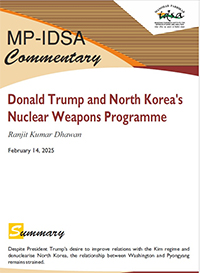Donald Trump and North Korea’s Nuclear Weapons Programme
- February 14, 2025 |
- IDSA Comments
Introduction
The Donald Trump administration after coming to power on 20 January 2025 expressed its desire to improve relations with the Kim dynasty regime in North Korea.1 Notably, on the day after his inauguration as the 47th President of the United States, Trump termed North Korea a “nuclear power” state, which caused apprehensions in South Korea.2 However, during his meeting with the Japanese Prime Minister, Shigeru Ishiba on 7 February 2025, Trump called for “complete denuclearisation” of North Korea.3
On the other hand, the North Korean regime has not yet responded to Trump’s gesture for restarting dialogue between the two countries. In the backdrop of the newly inaugurated second Trump administration, the Kim regime has been bolstering its nuclear weapons programme and has tested a more sophisticated cruise missile system. According to some analysts, Pyongyang will remain hostile towards the United States in 2025.4 Also, contrary to the expectations of President Trump, North Korea would probably not give up its nuclear weapons programme.
North Korea’s Nuclear Weapons Programme and the United States
The enmity between North Korea and the US dates back to the Cold War period of intense ideological rivalry between capitalism and communism. The US played a key role in the division of the Korean Peninsula in 1945, and also militarily supported South Korea during the Korean War (1950–1953), which ended only with an armistice. The brutalities committed by the American army and threat to use nuclear weapons during the Korean War shaped North Korea’s approach towards the US. The American military bases on the Korean Peninsula and stationing of tactical nuclear weapons by the US in South Korea during the Cold War were also opposed by North Korea.
In the post-Cold War period, North Korea’s nuclear weapons programme gained momentum. The nuclear programme was guided by Pyongyang’s goal for achieving self-reliance or Juche in the field of national defence.5 Despite being a member of the Non-Proliferation Treaty (NPT), North Korea secretly pursued the development of nuclear arsenal. In its pursuit of developing nuclear weapons technology, North Korea received some help from Pakistan.6 Since 2006, North Korea has tested various kinds of nuclear devices, and has been developing long-range ballistic missiles which are apparently capable of reaching North America and could target the mainland US.
The US has been strongly opposed to the North Korean nuclear weapons programme and has imposed severe economic sanctions against this reclusive regime. However, the fears of massive causalities and escalation of the conflict had deterred various administrations in the US to take pre-emptive strikes against the North Korean nuclear facilities. Remarkably, the previous Donald Trump administration in 2017 had even threatened to “totally destroy” North Korea. But the three rounds of meetings between Donald Trump and North Korean leader Kim Jong-un during 2018–2019 remained unsuccessful. Notably, the current Trump administration has again pledged for North Korea’s denuclearisation.
Why North Korea Will Not Denuclearise?
A few days after the inauguration of the second Trump administration, the North Korean state media reported that Kim Jong-un made a visit to a secret weapons-grade nuclear materials manufacturing facility in North Korea, where he called for the reinforcing of the “nuclear shield of the country”.7 The North Korean state media also stated that the nuclear weapons of the country should not be regarded as a “bargaining chip”.8 Further, Kim Jong-un on the occasion of the 77th founding anniversary of the (North) Korean People’s Army on 8 February 2025, spoke about the threats from the US as the reason for bolstering North Korea’s nuclear weapons programme.9 Therefore, it appears that North Korea is not interested in negotiations with the US to curb its nuclear arsenal.
Firstly, the ongoing Russia–Ukraine war since 2022 has provided useful lessons to the Kim dynasty regime in Pyongyang against denuclearisation. Also, North Korea and Russia signed a treaty on ‘Comprehensive Strategic Partnership’ for mutual defence in June 2024. As a result, the military engagement between Pyongyang and Moscow has increased significantly. Reportedly, North Korea has dispatched thousands of troops to Russia to fight against Ukraine, and has also provided Moscow with several tonnes of conventional weapons. In return, North Korea has apparently received rice, money and cutting-edge military reconnaissance satellite technology from Russia.10[x] North Korea has also been treating Russian soldiers wounded in combat operations against Ukraine.11 Also, there is a possibility that Moscow may even accept Pyongyang’s nuclear weapons development programme.12
Secondly, the Trump administration’s approach for peace with North Korea has not been accompanied with any significant effort for reduction in tensions between the two countries. Evidently, the military exercises between the US and South Korea have continued unabated since Trump took office in January 2025. On the other hand, North Korea has continued to be critical of the US–South Korea military alliance, including sale of weapons to Seoul by Washington.13 Also, the visit of an American nuclear-powered submarine to Busan in South Korea in February 2025 triggered angry response from North Korea.14 Moreover, the comment by the US Secretary of State Marco Rubio regarding North Korea as a “rogue state” was also vehemently criticised by Pyongyang.15
Thirdly, North Korea’s relations with South Korea have undergone profound changes since 2024. The Kim dynasty regime in North Korea has abolished the idea of reunification of the Korean Peninsula, and has probably amended its constitution to regard South Korea as a “hostile state”.16 North Korea has also destroyed roads and railway links with South Korea as part of Pyongyang’s ‘two hostile states’ policy.17 Therefore, South Korea is now a ‘separate and enemy’ country for North Korea. Arguably, this strategy of Pyongyang towards Seoul is to push South Korea to compromise and accept North Korea’s nuclear weapons programme.18
Conclusion
The rapidly developing nuclear capabilities of North Korea have been an issue of deep concern to the US. This also reflects the failure of all previous American administrations to get rid of the North Korean nuclear arsenal. The advent of the second Trump administration has raised hopes for a solution on this issue. However, there has not been any major shift in Trump’s policy towards the North Korean nuclear weapons programme. For its part, the Kim dynasty regime in Pyongyang has been strengthening its nuclear weapons capabilities and has been critical about the policies of second Trump administration. Therefore, it appears that North Korea’s denuclearisation shall remain only a propaganda campaign for the US and Pyongyang would not abandon its nuclear weapons programme.
Views expressed are of the author and do not necessarily reflect the views of the Manohar Parrikar IDSA or of the Government of India.
- 1. Yonhap, “Trump Says He Will Reach Out to N. Korea’s Kim Jong-Un Again”, The Korea Times, 24 January 2025.
- 2. Lee Hyo-jin, “Trump’s ‘Nuclear Power’ Reference to Pyongyang Alarms Seoul”, The Korea Times, 21 January 2025.
- 3. Lim Jeong-Won, “South Korea ‘Welcomes’ U.S, Japanese Leaders’ Call for North’s ‘Complete Denuclearization’”, Korea JoongAng Daily, 9 February 2025.
- 4. Kwak Yeon-soo, “NK Expected to Maintain Hostile Stance toward US, South Korea in 2025: Experts”, The Korea Times, 4 February 2025.
- 5. Edward Howell, “The Juche H-Bomb? North Korea, Nuclear Weapons and Regime-State Survival”, International Affairs, Vol. 96, No. 4, July 2020, pp. 1051–1068.
- 6. Ranjit Kumar Dhawan, “India’s Policy towards the North Korean Nuclear Weapons Program”, International Journal of Korean Unification Studies, Vol. 29, No. 1, 2020, pp. 135–159.
- 7. “Respected Comrade Kim Jong Un Inspects Nuclear-material Production Base and Nuclear Weapons Institute”, KCNA, 29 January 2025.
- 8. Yonhap, “North Korea Says Its Nuclear Weapons Are Not Bargaining Chip”, The Korea Herald, 8 February 2025.
- 9. “Respected Comrade Kim Jong Un Pays Congratulatory Visit to Ministry of National Defence on Day of KPA Founding”, KCNA, 9 February 2025.
- 10. Kim Arin, “$200m A Year, 700,000 Tons of Rice, Space Tech: The Deal for North Korea in Joining Russia’s War”, The Korea Herald, 3 November 2024.
- 11. Seo Ji-Eun, “Russian Troops Injured in Ukraine Receiving Treatment in North Korea, Says Moscow’s Envoy to Pyongyang”, Korea JoongAng Daily, 11 February 2025.
- 12. Yonhap, “U.S. Warns Russia May Accept North Korea’s Nuclear Program, Reversing Denuclearization Stance”, Korea JoongAng Daily, 19 December 2024.
- 13. Yonhap, “North Korea Calls U.S. Weapons Sales to South ‘Attempt to Destroy the Balance of Power’”, Korea JoongAng Daily, 2 February 2025.
- 14. “Press Statement of Spokesperson for DPRK Ministry of National Defence”, KCNA, 11 February 2025.
- 15. “Spokesman for DPRK Foreign Ministry Issues Press Statement”, KCNA, 3 February 2025.
- 16. “Roads and Railways to ROK Completely Blocked: KCNA Report”, KCNA, 17 October 2024.
- 17. Yonhap, “N. Korea to Cut Off Roads, Railways Connected to S. Korea”, The Korea Times, 9 October 2024.
- 18. Ji Da-gyum, “NK’s Gradual Unveiling of Constitutionalizing ‘2 Hostile Koreas’ Exposes Dilemma: Experts”, The Korea Herald, 13 November 2024.






